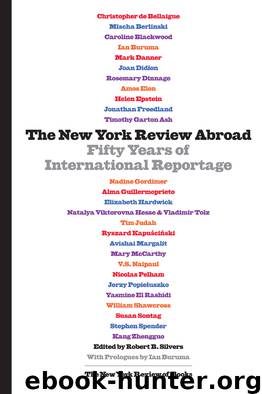The New York Review Abroad by Robert B. Silvers

Author:Robert B. Silvers [Silvers, Robert B.]
Language: eng
Format: epub
ISBN: 978-1-59017-632-0
Publisher: New York Review Books
Published: 2013-06-03T16:00:00+00:00
Indeed, the question is not why there is any cultural activity in Sarajevo now after seventeen months of siege, but why there isn’t more. Outside a boarded-up movie theater next to the Chamber Theater is a sun-bleached poster for The Silence of the Lambs with a diagonal strip across it that says DANAS (today), which was April 6, 1992, the day movie-going stopped. Since the war began, all of the movie theaters in Sarajevo have stayed shut, even if not all have been severely damaged by shelling. A building in which people gather so predictably would be too tempting a target for the Serb guns; anyway, there is no electricity to run a projector. There are no concerts, except for those given by a lone string quartet that rehearses every morning and performs very occasionally in a small room seating forty people, which also doubles as an art gallery. (It’s in the same building on Marshal Tito Street that houses the Chamber Theater.) There is only one active space for painting and photography—the Obala Gallery, whose exhibits sometimes stay up only one day and never more than a week.
No one I talked to in Sarajevo disputes the sparseness of cultural life in this city where, after all, between 300,000 and 400,000 inhabitants still live. The majority of the city’s intellectuals and creative people, including most of the faculty of the University of Sarajevo, fled at the beginning of the war, before the city was completely encircled. Besides, many Sarajevans are reluctant to leave their apartments except when it is absolutely necessary, to collect water and their UNHCR rations; though no one is safe anywhere, they have more to fear when they are in the street. And beyond fear, there is depression—most Sarajevans are very depressed—which produces lethargy, exhaustion, apathy.
Moreover, Belgrade was the cultural capital of former Yugoslavia, and I have the impression that in Sarajevo the visual arts were derivative; that ballet, opera, and musical life were routine. Only film and theater were distinguished, so it is not surprising that these continue in Sarajevo under siege. A film production company, SAGA, makes both documentary and fiction films, and there are the two functioning theaters.
In fact, the audience for theater expects to see a play like Waiting for Godot. What my production of Godot signifies to them, apart from the fact that an eccentric American writer and part-time director volunteered to work in the theater as an expression of solidarity with the city (a fact inflated by the local press and radio as evidence that the rest of the world “does care”—when I knew, to my indignation and shame, that I represented nobody but myself), is that this is a great European play and that they are members of European culture. For all their attachment to American popular culture, which is as intense here as anywhere else, it is the high culture of Europe that represents for them their ideal, their passport to a European identity. People had told me again and again on my earlier visit in April: We’re part of Europe.
Download
This site does not store any files on its server. We only index and link to content provided by other sites. Please contact the content providers to delete copyright contents if any and email us, we'll remove relevant links or contents immediately.
| Civil Rights | Discrimination |
| General | Human Rights |
Day by Elie Wiesel(2779)
The Age of Genius by A. C. Grayling(2584)
Gideon's Spies: The Secret History of the Mossad by Gordon Thomas(2337)
The Gulag Archipelago (Vintage Classics) by Aleksandr Solzhenitsyn(2093)
FATWA: Hunted in America by Pamela Geller(1998)
Columbine by Dave Cullen(1863)
Men Explain Things to Me by Rebecca Solnit(1724)
The Rule of Law by Bingham Tom(1689)
Anatomy of Injustice by Raymond Bonner(1656)
Examples & Explanations: Administrative Law by William F. Funk & Richard H. Seamon(1639)
Three Cups of Tea by Greg Mortenson(1613)
The Source by James A. Michener(1602)
That Every Man Be Armed by Stephen P. Halbrook(1576)
ADHD on Trial by Michael Gordon(1572)
Future Design by Unknown(1566)
Gideon's Spies by Gordon Thomas(1500)
Palestinian Walks by Raja Shehadeh(1494)
Constitutional Theory by Carl Schmitt(1450)
Nothing to Envy by Barbara Demick(1445)
